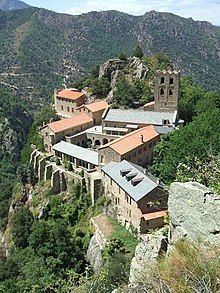Abbey of Saint-Martin-du-Canigou
| Abbey of Saint-Martin-du-Canigou | |
|---|---|

Saint-Martin-du-Canigou
|
|
| Basic information | |
| Location | near Casteil, Prades, Pyrénées-Orientales, Languedoc-Roussillon region, France |
| Geographic coordinates | 42°31′41″N 2°24′03″E / 42.528144°N 2.400892°ECoordinates: 42°31′41″N 2°24′03″E / 42.528144°N 2.400892°E |
| Affiliation | Roman Catholic |
| Municipality | Casteil |
| District | Prades |
| State | Pyrénées-Orientales |
| Region | Languedoc-Roussillon |
| Country | France |
| Ecclesiastical or organizational status | Monastery |
| Status | Active |
| Website | http://stmartinducanigou.org/ |
| Architectural description | |
| Architectural type | Abbey church |
| Architectural style | Romanesque |
| Groundbreaking | 1005 |
| Completed | 1009 |
| Designated as NHL | Monument historique (1889) |
The abbey of Saint-Martin-du-Canigou (Catalan: Sant Martí del Canigó) is a monastery built in 1009 in the Pyrenees on Canigou mountain in present-day southern France near the Spanish border.
Pablo Casals wrote a composition entitled "Sant Marti Del Canigo" for Orchestra.
The monastery is located on the territory of the commune of Casteil, in the Pyrénées-Orientales département.
The original Romanesque style monastery was built from 1005 to 1009 by Guifred, Count of Cerdanya (Fr. Cerdagne), in atonement for the murder of his son and was populated by Benedictine monks.
In 1049, Guifred, Count of Cerdanya, died at the monastery he had built. In 1051 a messenger set forth to visit religious houses throughout Europe to solicit prayers for his dead master. He brought a parchment upon which at each stop were added words of prayer and respect. This parchment has survived and scholars (including Léopold Delisle with his Rouleaux des Morts du IX au XV Siecle of 1866) have used it to discover differences in culture between northern and southern Europe in a single given year. Some of the discoveries from this important document include that southern culture was more staid and bound by custom while the northern culture more free form and experimental in their writing styles, use of words and grammar.
The monastery was damaged in the Catalan earthquake of 1428.
...
Wikipedia
